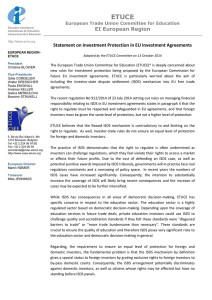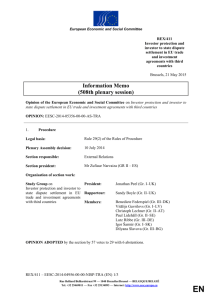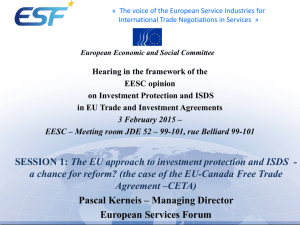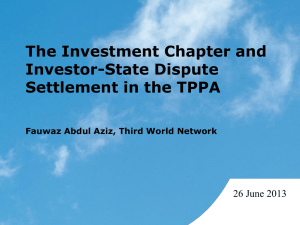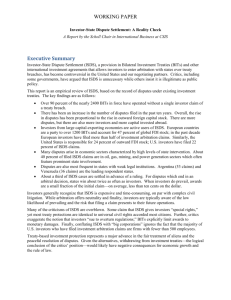ICC - ESF
advertisement
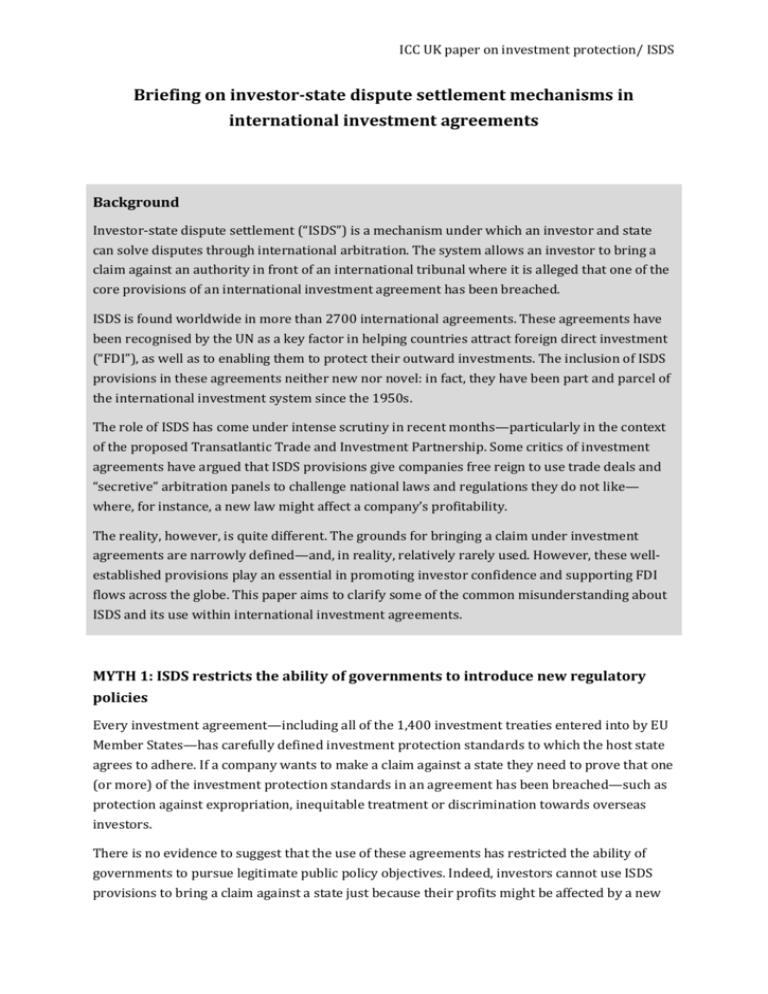
ICC UK paper on investment protection/ ISDS Briefing on investor-state dispute settlement mechanisms in international investment agreements Background Investor-state dispute settlement (“ISDS”) is a mechanism under which an investor and state can solve disputes through international arbitration. The system allows an investor to bring a claim against an authority in front of an international tribunal where it is alleged that one of the core provisions of an international investment agreement has been breached. ISDS is found worldwide in more than 2700 international agreements. These agreements have been recognised by the UN as a key factor in helping countries attract foreign direct investment (“FDI”), as well as to enabling them to protect their outward investments. The inclusion of ISDS provisions in these agreements neither new nor novel: in fact, they have been part and parcel of the international investment system since the 1950s. The role of ISDS has come under intense scrutiny in recent months—particularly in the context of the proposed Transatlantic Trade and Investment Partnership. Some critics of investment agreements have argued that ISDS provisions give companies free reign to use trade deals and “secretive” arbitration panels to challenge national laws and regulations they do not like— where, for instance, a new law might affect a company’s profitability. The reality, however, is quite different. The grounds for bringing a claim under investment agreements are narrowly defined—and, in reality, relatively rarely used. However, these wellestablished provisions play an essential in promoting investor confidence and supporting FDI flows across the globe. This paper aims to clarify some of the common misunderstanding about ISDS and its use within international investment agreements. MYTH 1: ISDS restricts the ability of governments to introduce new regulatory policies Every investment agreement—including all of the 1,400 investment treaties entered into by EU Member States—has carefully defined investment protection standards to which the host state agrees to adhere. If a company wants to make a claim against a state they need to prove that one (or more) of the investment protection standards in an agreement has been breached—such as protection against expropriation, inequitable treatment or discrimination towards overseas investors. There is no evidence to suggest that the use of these agreements has restricted the ability of governments to pursue legitimate public policy objectives. Indeed, investors cannot use ISDS provisions to bring a claim against a state just because their profits might be affected by a new ICC UK paper on investment protection/ ISDS government policy. Most often claims are brought in extreme situations—such as where a company’s assets are expropriated without proper recompense; or where existing foreign investors are discriminated against compared to local competitors. In some circumstances, investors may make a claim where the introduction of new laws significantly limits the ability of a company to operate in a particular jurisdiction. This problem is often referred to as “regulatory expropriation”—an issue that has grown in prominence in recent years as many governments have sought to disguise protectionist policies by reference to safety- or environmental-related goals. In this context, it is vital that investors have a means to challenge domestic laws where one of the central guarantees granted by an existing investment agreement is violated. ISDS can therefore act as an important check on protectionist or “nationalistic” policies, as well as ensuring that investors are adequately compensated for harm caused by breaches of investment treaty rules. MYTH 2: Governments and consumers do not have access to a comparable instrument to hold investors to account International investors are bound to high standards of behavior by a number of standards and guidelines—both in the form of local laws and regulations and international frameworks such as the OECD Guidelines for Multinational Enterprises. These provide governments and consumers with a range of channels to hold investors to account if they do not adhere to established standards—for instance in relation to their social and environmental performance. MYTH 3: ISDS is only used by investors because it is a “secretive” process ISDS is used in relatively rare—but highly serious—situations. When investors do seek to bring a claim, however, there are a variety of reasons why international arbitration panels may be seen as preferable to local court actions. Two of the key advantages of international arbitration are: - Enforceability: companies investing abroad may be faced with problems which cannot be solved through the domestic legal system, because in many countries investment agreements are not directly enforceable in local courts. This means that international arbitration is often the only means to obtain redress when an alleged breach of an investment agreement occurs. - Neutrality: investors may be reluctant to bring claims in local courts due to perceptions of bias or a lack of judicial independence. Including ISDS provisions removes this inherent political risk and, in doing so, promotes investor confidence (particularly in the context of large-scale or long-term investments). The confidential—or “secretive”—nature of arbitration has received significant attention in both trade and legal circles in recent years. In this context, it is important to note that ICC UK paper on investment protection/ ISDS confidentiality is an important requirement in many business-related disputes due to the risks of disclosing commercially sensitive information to competitors within the same market or sector. Confidentiality in commercial disputes is not a feature that is entirely unique to international arbitration: in some disputes, for instance, local courts may choose to restrict the disclosure of issues or documents. MYTH 4: ISDS panels are more likely to rule in favour of investors than Governments Statics available indicate that [a large proportion of ISDS panels find in favour of host states. According to the UN, of the 244 concluded BIT cases known by the end of 2012, 42% of the decisions were in favour of the host state; 31% of decisions were issued in favour of the investor and approximately 27% were settled. MYTH 5: ISDS is only used by US investors Contrary to popular perception, EU investors have been amongst the biggest users of the dispute settlement procedures, and account for a growing number of cases. Of the 214 (known) ISDS cases registered worldwide for the period 2008-2012, EU investors accounted for 53 % of the cases (113 cases) with investors from the Netherlands, Germany and the United Kingdom the main users. The sharp increase in EU investors’ use of ISDS is even more noticeable in the figures for recent claims. Of the 52 cases initiated in 2012, EU investors were behind 60 % of all claims, while US investors accounted only for 7.7%. MYTH 7: ISDS is only necessary in trade agreements with developing countries. As has been noted by a recent European Commission study, the problems investors face which may lead them to invoke an investment agreement—including issues around the lack of due process in local court systems—have not been confined to emerging markets, but also developed countries where the rule of law is generally observed and legal systems are robust.
